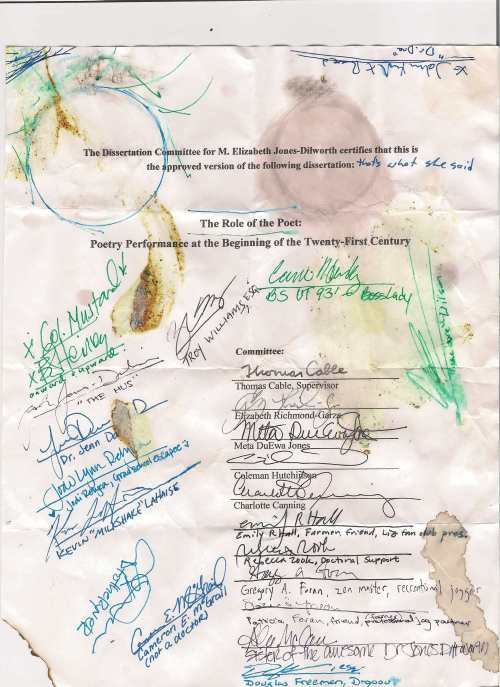I attended three defenses last week, and, as I discussed with some of my colleagues, they are idiosyncratic events. So much of the tone of the defense is controlled by the group dynamic of professors–and those professors do not always behave predictably. Still, there are a few defense strategies that I feel could be useful to others.
I was very nervous, as I believe I mentioned. So I devised a preparation schedule in the couple of weeks before my defense that was non-strenuous, but more productive than simply stewing. I read my dissertation out loud, about 15 pages at a time, in order to catch typos and improve sentence clarity. I knew the committee might give me revisions, but I figured getting the dissertation polished in preparation for its final submission was a good use of time. I also decided to completely finish my reading list for the project. This was unnecessary but not a waste of time. I checked out 20 books from the library, going through most of them in a matter of minutes (they were at the bottom of my list, after all, and most were not helpful), but spending a couple of days on some. My idea was simply to feel confident about my breadth of knowledge.
During my defense week, two of my best friends came in from out of town. They are the kind of friends who did not mind listening to me practice my opening statement three timese. We had a restful day before the defense, which included going to the wildflower center and wandering around a meadow, eating at the vegetarian restaurant where my brother-in-law cooks (chosen for its restful vibe), and going to yoga. Yoga was a *very* good idea. Then Emily gave me a shoulder massage, and Rebecca stood on my thigh bones (a yoga assist said to ground you and help you sleep).
Defense morning, Emily & Rebecca, plus the Future Mister Doctor (oooooh, shit–he’s the Mister Doctor Jones now!) and I got breakfast tacos at my beloved Taco Shack, where the three of them proceeded to give me some warm up questions. I did sort of draw a blank at the first question, so I was glad to have the warm-up. The three of them all took notes during the defense so I didn’t have to worry about that. Afterward, the party was twice as exciting with them there. This strategy would only work, though, with very close friends who are also not stressful (or stressed out by traveling). It’s really important to understand that energy dynamic between yourself and other people before inviting someone into your space during a stressful time.
During the defense, I accidentally happened upon three helpful strategies. First, I found the questions asked interesting. I didn’t consciously try to do that, but I realized afterward that my interest in what was said prevented me from getting defensive in a bad way.
Second, I practiced a bit of selective hearing. The Mister Doctor and my DSG partner Doctor Anderson said that my committee kept trying to draw the conversation into abstract theory land, and I kept answering the questions in the concrete terms of my dissertation. I didn’t mean to do that, but by choosing to answer the part of the question I found most interesting, I also kept the conversation focused on my area of expertise.
Finally, there was one question–or remark, rather, that really pissed me off. Luckily it came at the end when I was feeling confident and relaxed. I thought about ignoring it, but decided to (gently) contradict the professor instead. While none of my committee seemed to find my correction awkward or upsetting, my friends were like, “I’m so glad you stood up for yourself!” And I was too.
Of all the advice I received before the defense, I am most grateful that I asked my advisor directly what he wanted in an opening statement. It was good to get on the same page with that. But secondly, I was grateful for the gossip on committee politics. Thinking about that beforehand helped me instantly understand a very weird moment in my defense. That moment was not bad, but it was all about my professors’ relationships with each other and not about my project. It also helped me come to terms with the way the committee instantly scattered afterward (a function, I believe, of them not knowing each other very well) when I wanted to bask in my moment of glory for a bit longer.
When asked to discuss my project, I have often floundered and felt uncomfortable. I am very proud and happy that I was able to peak at the right time in terms of discussing my project–I had never felt so confident about it. Maybe my idiosyncratic strategies will be helpful to you–or maybe they will inspire you to think of some other strategies better suited to your personality. Either way, I’m glad I devoted time to trying to ensure that grad school ended well. I didn’t have complete control of the situation, so I almost gave up on it–with an “it is what it is” attitude. But I am glad I made the effort to control, if not the situation, at least myself.

